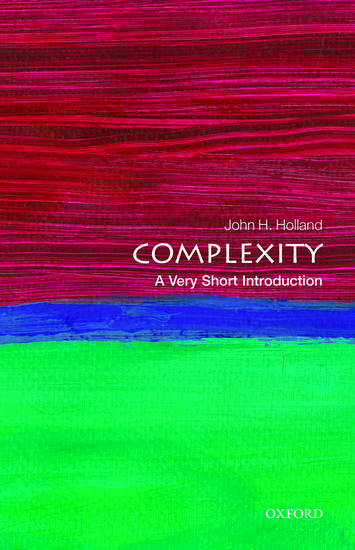Home >
A Very Short Introduction >
Complexity (History)
A Very Short Introduction | History
Complexity
ISBN: 9780199662548
Series: A Very Short Introduction
Complexity (History)
A Very Short Introduction Complexity (History) Media > Books > Non-Fiction > Education Books Expect Delays of Up to 4 Weeks| Order Below |
ISBN
9780199662548 (10-digit ISBN: 0199662541)
- Description
- Key Features
- Series Description
- Table of Contents
- Focuses on the scientific and mathematical principles underlying the science of complexity
- Shows how many processes in nature can be understood using complexity
- Explores a series of examples to highlight and explain the various types of complex systems
- Includes examples from the physical and biological sciences, as well as the applications in economics and management
The importance of complexity is well-captured by Hawking's comment: "Complexity is the science of the 21st century". From the movement of flocks of birds to the Internet, environmental sustainability, and market regulation, the study and understanding of complex non-linear systems has become highly influential over the last 30 years.
In this Very Short Introduction, one of the leading figures in the field, John Holland, introduces the key elements and conceptual framework of complexity. From complex physical systems such as fluid flow and the difficulties of predicting weather, to complex adaptive systems such as the highly diverse and interdependent ecosystems of rainforests, he combines simple, well-known examples — Adam Smith's pin factory, Darwin's comet orchid, and Simon's 'watchmaker' — with an account of the approaches, involving agents and urn models, taken by complexity theory.
Oxford's Very Short Introductions series offers concise and original introductions to a wide range of subjects--from Islam to Sociology, Politics to Classics, Literary Theory to History, and Archaeology to the Bible.
Not simply a textbook of definitions, each volume in this series provides trenchant and provocative--yet always balanced and complete--discussions of the central issues in a given discipline or field. Every Very Short Introduction gives a readable evolution of the subject in question, demonstrating how the subject has developed and how it has influenced society. Eventually, the series will encompass every major academic discipline, offering all students an accessible and abundant reference library.
Whatever the area of study that one deems important or appealing, whatever the topic that fascinates the general reader, the Very Short Introductions series has a handy and affordable guide that will likely prove indispensable.
Please note: As this series is not ELT material, these titles are not subject to discount.
1: Complex systems
2: Complex physical systems
3: Complex adaptive systems
4: Agents, networks, degree, and recirculation
5: Specialization and diversity
6: Emergence
7: Co-evolution and the formation of niches
8: Putting it all together
Further reading
Index
The importance of complexity is well-captured by Hawking's comment: "Complexity is the science of the 21st century". From the movement of flocks of birds to the Internet, environmental sustainability, and market regulation, the study and understanding of complex non-linear systems has become highly influential over the last 30 years.
In this Very Short Introduction, one of the leading figures in the field, John Holland, introduces the key elements and conceptual framework of complexity. From complex physical systems such as fluid flow and the difficulties of predicting weather, to complex adaptive systems such as the highly diverse and interdependent ecosystems of rainforests, he combines simple, well-known examples — Adam Smith's pin factory, Darwin's comet orchid, and Simon's 'watchmaker' — with an account of the approaches, involving agents and urn models, taken by complexity theory.
Key Features
- Focuses on the scientific and mathematical principles underlying the science of complexity
- Shows how many processes in nature can be understood using complexity
- Explores a series of examples to highlight and explain the various types of complex systems
- Includes examples from the physical and biological sciences, as well as the applications in economics and management
Series Description
Oxford's Very Short Introductions series offers concise and original introductions to a wide range of subjects--from Islam to Sociology, Politics to Classics, Literary Theory to History, and Archaeology to the Bible.
Not simply a textbook of definitions, each volume in this series provides trenchant and provocative--yet always balanced and complete--discussions of the central issues in a given discipline or field. Every Very Short Introduction gives a readable evolution of the subject in question, demonstrating how the subject has developed and how it has influenced society. Eventually, the series will encompass every major academic discipline, offering all students an accessible and abundant reference library.
Whatever the area of study that one deems important or appealing, whatever the topic that fascinates the general reader, the Very Short Introductions series has a handy and affordable guide that will likely prove indispensable.
Please note: As this series is not ELT material, these titles are not subject to discount.
EASY ORDER FORM
PRICES LISTED INCLUDE CONSUMPTION TAX
Price Before Tax:
¥1,790


